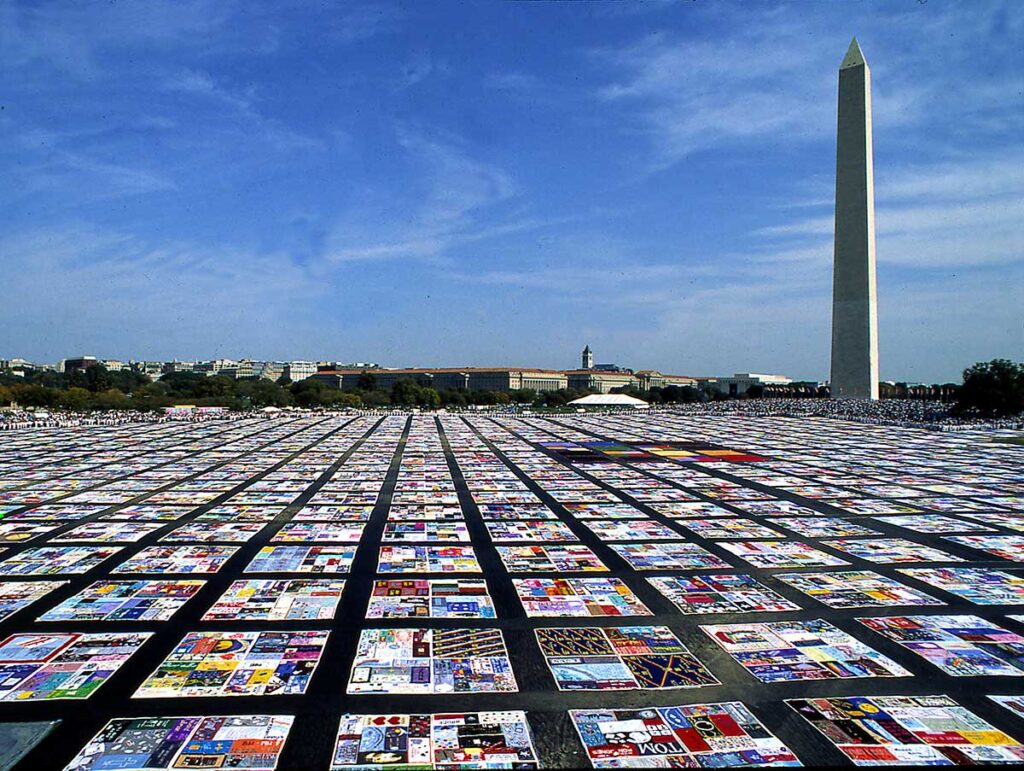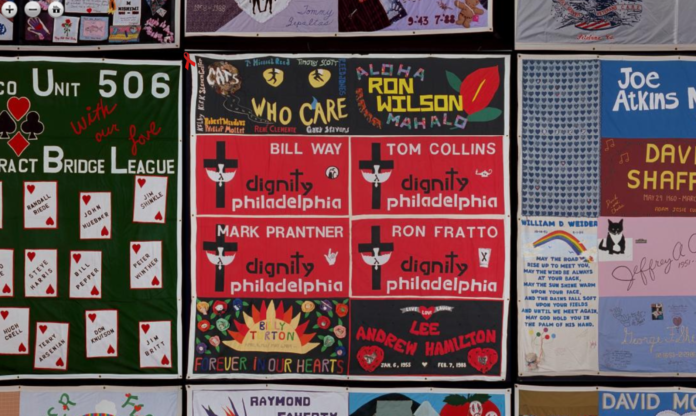On December 1st we will honor World AIDS Day as our community has done for over 30 years. However, as part of the new normal of COVID-19 related shutdowns, this year’s events have gone virtual. One of those virtual representations includes the NAMES Project AIDS Memorial Quilt. It is considered to be the world’s largest piece of community folk art, weighing in at some 54 tons.
This year, like most things in the world, the AIDS Quilt is going digital. Display hosts, who would normally create in-person displays with portions of the quilt, will instead curate quilt sections virtually. It is the quilt’s first ever 50-state exhibition.
Nearly 700,000 Americans have died from AIDS-related complications in the past 40 years. The idea for the quilt was conceived in 1985 by activist Cleve Jones, and it was displayed for the first time in 1987 on the National Mall in Washington, D.C. At that time the quilt was larger than a football field. World AIDS Day 2020 is an especially pertinent time to remember the legacy of the Quilt as society is faced with a new global health concern.

“We have more than 130 Quilt displays as part of the exhibition from organizations all across the country and the list keeps growing,” said Kevin Herglotz, spokesperson for the National AIDS Memorial in San Francisco, where he makes his home with his husband and daughter. As a native to the Delmarva region who served in the Delaware National Guard and spent much time in the Gayborhood when he was coming out, he has a personal connection to the Delaware Valley.
“We will continue to accept display hosts, because we want to make this exhibition as large as possible,” he concluded. “The Quilt is a way we can help educate people, to tell the stories of those we’ve lost, and hopefully use its beauty and power to help our nation heal during these difficult times.”
Local hosts include the LGBT Center at the University of Pennsylvania, the Philadelphia College of Osteopathic Medicine, the New Jersey Chapter of the AIDS Memorial Quilt, the South Jersey AIDS Alliance, and the Delaware Chapter of the AIDS Memorial Quilt. Virtual hosts are allowed to choose eight panels with significance to their region or organization.
“We specifically chose blocks of the quilt that held significance to our area,” said Georgett Watson of the South Jersey AIDS Alliance (SJAA) who works out of the group’s Atlantic City office. “When someone makes a quilt, seeing it again brings their loved one back to life. All the memories flood back! We want to show our region that we will not forget your loved one, and we will hold them and their memories with us forever.”
Robert Lord-Schell is a team leader with SJAA who lives in Philadelphia, and works in their Camden location. Given the community he serves, he readily sees similarities between the early AIDS-epidemic and today’s COVID-pandemic on a socio-economic level.
“Minority groups and communities are getting hit harder, just like during the beginning of the AIDS’s epidemic,” says Lord-Schell. “We are not taking the time to respond to the disease correctly. Certain groups are yelling red alert and other groups are not listening.”
Lord-Schell, and many others in the LGBT-community, say the LGBTQ community seems more willing to implement harm reduction faster than other groups.
“The community has learned from the AIDS epidemic that changing behaviors saves lives. So the community is willing to wear mask, stay at home, socialize over Zoom, stay six-feet apart, and have harm reduction pandemic sex.”
Rev. Naomi Washington-Leapheart is Director for Faith-Based and Interfaith Affairs in the Mayor’s Office of Public Engagement here in Philly and will deliver the invocation for the upcoming World AIDS Day commemoration. She is a faculty member in the Theology and Religious Studies department at Villanova University, and a board member with SIECUS: Sex Ed for Social Change.
As a Black queer woman, Washington-Leapheart has worked for years to build power and justice in Black and LGBTQ freedom movements. Her blessing will remind us that simply honoring in remembrance those we have lost is important work.
“I hope to remind us that though we have lost so many and so much because of AIDS, we remain powerful as we claim dignity and agency through our fight to keep surviving and thriving,” she shared. “Despite all the efforts to ignore, stigmatize, and forget those who have died, for more than 40 years, people in this movement have been committed to saying their names, telling their stories, and continuing their work.”
Washington-Leapheart also sees the abundant similarities between the AIDS-epidemic and COVID. Her statement echoes what Lord-Schell said when referencing how both health crises have harmed minorities and queer people.
“We have had to withstand society’s denial and indifference about things that can literally kill us. In the invocation I hope to affirm what the AIDS advocacy movement has taught us about how to care for our most vulnerable, and how to respond even when we don’t understand.”
The AIDS Memorial Quilt virtual exhibition runs through March 31.
